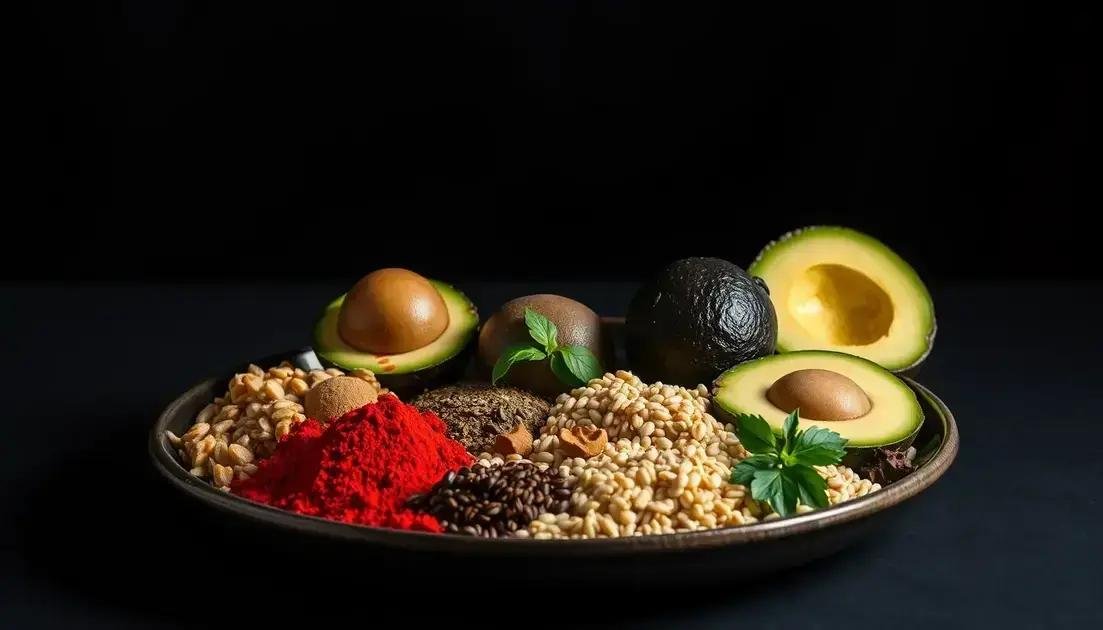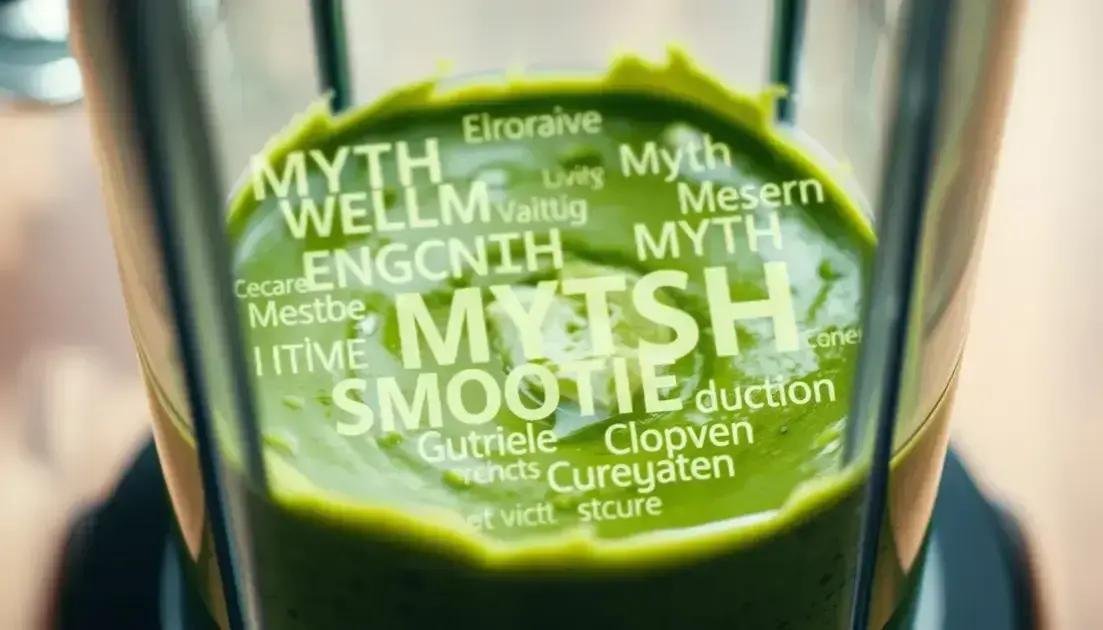
Unveiling Truths: Debunking Popular Nutrition Myths About Food
-
Lucas Souza
-
19, janeiro, 2025
Topics
 Shared
Shared
In today’s world, information is at our fingertips, yet misconceptions persist, especially around nutrition.
This blog post tackles debunking common nutrition myths, offering truthful insights and advice.
Let’s explore and reevaluate what we often accept without question.
Ready to separate fact from fiction? Our outlines dive deep into these myths.
Myth: Carbs Are Always Bad
Myth: Carbs Are Always Bad
Many people mistakenly believe that all carbohydrates lead to weight gain and should be avoided. However, carbohydrates are essential for energy and overall health. They are found in fruits, vegetables, and whole grains, which provide vital nutrients. The key is to choose complex carbs, like those in whole foods, rather than refined sugars and processed options.
Myth: Fat-Free Means Healthy
Fat-free foods are often marketed as healthier choices. Yet, these products may contain added sugars or fillers to enhance flavor. Healthy fats from sources like avocados, nuts, and olive oil contribute to a balanced diet and can aid in nutrient absorption.
Myth: Skipping Meals Aids Weight Loss
Skipping meals might lead to temporary weight loss, but it can backfire by slowing the metabolism and causing overeating later. Eating regular, balanced meals helps maintain energy levels and supports metabolic health.
Myth: All Calories Are Equal
Not all calories provide the same benefits to the body. Nutrient-dense foods such as fruits and vegetables supply essential vitamins and minerals, while empty-calorie foods lack nutritional value. Quality matters as much as quantity in calorie consumption.
Myth: Supplements Always Improve Health
Many believe that supplements can replace whole foods. While some supplements can address specific deficiencies, whole foods provide a synergy of nutrients that work better together than any supplement. It’s best to focus on a varied diet first.
Myth: Natural Sugar Isn’t Sugar
While natural sugars, like those in fruits, come with additional nutrients, they still contribute to overall sugar intake. Moderation is important, as excessive sugars, even from natural sources, can lead to health issues like obesity and diabetes.
Myth: Detox Diets Cleanse the Body
The body has its own natural detoxification systems, including the liver and kidneys. Extreme detox diets often lead to nutrient deficiencies. A balanced diet with adequate hydration is a more effective way to support the body’s detox processes.
Myth: Gluten-Free Is Healthier
Gluten-free products are often marketed as healthier, but they can be highly processed and lack essential nutrients. Unless diagnosed with celiac disease or gluten sensitivity, there’s usually no health benefit to a gluten-free diet.
Myth: Organic Food Is Always Better
While organic foods are associated with certain farming practices, they are not always more nutritious than conventionally grown produce. Prioritizing a variety of fruits and vegetables, regardless of how they are grown, is what’s most important for health.
Myth: Late-Night Eating Causes Weight Gain
Eating late at night does not inherently cause weight gain. What matters most is total daily caloric intake and food choices rather than the timing of meals. Healthy nighttime snacks can be part of a balanced diet.
Myth: Red Meat Is Unhealthy
Red meat can be part of a healthy diet when consumed in moderation. It provides important nutrients like protein, iron, and vitamin B12. Choosing lean cuts and cooking methods can mitigate health risks.
Myth: Dairy Is Essential for Strong Bones
Dairy is often touted as crucial for bone health due to its calcium content. However, there are many non-dairy sources of calcium, such as fortified plant-based milks, leafy greens, and almonds, making it possible to maintain strong bones without dairy.
Myth: Fat-Free Means Healthy

Myth: Fat-Free Means Healthy
Many foods labeled as fat-free can appear to be healthier options. However, these products often contain high amounts of sugar or artificial ingredients to enhance flavor, which can counteract any perceived benefits. Healthy fats, found in sources like olive oil, nuts, and avocados, are essential for a balanced diet. They help in nutrient absorption and support overall health. Instead of avoiding fats altogether, focus on incorporating moderate amounts of healthy fats while keeping an eye on the overall quality of your diet.
Myth: Skipping Meals Aids Weight Loss
Myth: Skipping Meals Aids Weight Loss
Many believe that skipping meals can help them lose weight faster. However, this practice can be harmful and counterproductive. When you skip meals, your body goes into conservation mode, slowing down your metabolism to save energy. This can lead to overeating later in the day, as hunger becomes harder to control.
Instead of skipping meals,
eating small, balanced meals throughout the day helps maintain energy levels and keeps your metabolism steady. Including protein, healthy fats, and fiber can help you feel full longer, making weight loss easier.
Myth: All Calories Are Equal

Myth: All Calories Are Equal
Not all calories provide the same health benefits. While it’s true that weight management depends on calorie intake, the type of calories consumed matters significantly. Foods rich in nutrients, like fruits, vegetables, and whole grains, fuel the body better than empty-calorie foods like sugary snacks and sodas.
Nutrient-dense foods support overall health, helping to prevent illness and maintain energy levels. Instead of focusing solely on calorie counting, aim for a balanced diet that prioritizes quality over quantity.
This approach will not only help with weight management but also improve overall well-being.
Myth: Supplements Always Improve Health
Myth: Supplements Always Improve Health
Many people think that taking supplements will automatically enhance their health. However, supplements are not a replacement for a balanced diet. While they can be helpful in certain situations, such as when a person has a deficiency, relying solely on them is not ideal. Whole foods provide a complex range of vitamins, minerals, and other nutrients that work better together than isolated supplements. It’s best to focus on getting nutrients from a variety of foods. This ensures the body receives all necessary elements for optimal functioning.
Myth: Natural Sugar Isn’t Sugar

Myth: Natural Sugar Isn’t Sugar
Many people think that natural sugars, like those found in fruits or honey, are completely healthy and should be consumed freely. While these sources contain vitamins and minerals, they still contribute to overall sugar intake. Natural sugars can lead to health issues like weight gain and increased blood sugar levels if consumed excessively. It’s important to enjoy natural sugars in moderation, just as one should with refined sugars.
Striving for a balanced diet rich in whole, unprocessed foods can help maintain a healthy lifestyle.
Myth: Detox Diets Cleanse the Body
Detox diets are often marketed as a way to cleanse the body, but this is a common myth.
The truth is that the human body is naturally equipped to detoxify itself through the liver, kidneys, and digestive system.
Detox diets are not necessary
In fact, they can lead to nutrient deficiencies if not properly managed.
A balanced diet that includes fruits, vegetables, and whole grains supports the body’s natural detoxification processes.
Myth: Gluten-Free Is Healthier

Myth: Gluten-Free Is Healthier
Many believe that a gluten-free diet is healthier for everyone. However, gluten-free foods can often be processed and contain added sugars and fats. For those without gluten sensitivities or celiac disease, there is no added benefit to avoiding gluten. In fact, whole grains that contain gluten, like quinoa or whole wheat, are packed with nutrients that are beneficial for health.
Choosing a diet rich in various whole foods is essential regardless of gluten content. Focus on balanced meals instead of solely eliminating gluten.
Myth: Organic Food Is Always Better
Myth: Organic Food Is Always Better
Many people believe that organic food is inherently healthier than conventionally grown food. While organic products are often produced without synthetic pesticides and fertilizers, that doesn’t automatically make them more nutritious. Conventionally grown fruits and vegetables can also provide essential vitamins and minerals. What truly matters is consuming a variety of fresh produce, regardless of how it is grown. Eating a diet rich in fruits and vegetables is the most important factor for overall health.
Myth: Late-Night Eating Causes Weight Gain

Late-night eating is often blamed for weight gain, leading many to believe that consuming food during the evening hours is detrimental to their health.
However, the timing of meals is less significant than the total calories consumed throughout the day.
Eating late at night does not inherently cause weight gain if you are within your caloric needs.
What matters most is what you eat
Choosing healthy, balanced snacks can be part of a nutritious diet.
It’s essential to maintain moderation and focus on overall dietary habits, regardless of meal timing.
Myth: Red Meat Is Unhealthy
Myth: Red Meat Is Unhealthy
There is a common belief that red meat is bad for your health. However, red meat can be part of a balanced diet when consumed in moderation. It is a rich source of protein, iron, and essential nutrients, which are important for overall health.
Choosing lean cuts and cooking methods can help reduce any potential health risks. Additionally, individuals should focus on a variety of protein sources, including plant-based options, to maintain a well-rounded diet.
Myth: Dairy Is Essential for Strong Bones

Myth: Dairy Is Essential for Strong Bones
Many believe that dairy is necessary for strong bones due to its calcium content. While dairy can be a good source of calcium, it is not the only option. Many non-dairy foods like leafy greens, almonds, and fortified plant-based milks also provide ample calcium.
Other Nutrients Matter
Additionally, other nutrients like vitamin D and magnesium are important for bone health and can be found in various foods. A balanced diet that includes a variety of these nutrients supports strong bones without relying solely on dairy products.
Conclusion
By debunking common nutrition myths, we can make informed choices about our diets.
Understanding that carbohydrates, fats, and certain foods have their place in a balanced diet is crucial.
It is important to focus on quality, variety, and moderation rather than adhering to strict rules based on myths.
This approach promotes overall health and helps individuals achieve their nutritional goals.
Frequently Asked Questions about Nutrition and Health
Are all carbohydrates bad for my health?
No, not all carbohydrates are bad. Whole grains, fruits, and vegetables are healthy sources of carbs that provide nutrients and energy.
Does fat-free mean a food is healthy?
Not necessarily. Fat-free foods can contain added sugars and unhealthy ingredients, so it’s important to check the overall nutritional content.
Will skipping meals aid in my weight loss efforts?
Skipping meals can lead to overeating later and slow down your metabolism. Regular, balanced meals are more effective for weight management.
Do all calories provide the same benefits?
No, the source of calories matters. Nutrient-dense foods provide health benefits while empty-calorie foods can lead to health issues.
Will taking supplements always benefit my health?
Supplements are not a replacement for a balanced diet. Whole foods provide nutrients more effectively than isolated supplements.
Does natural sugar have no effects on health?
Natural sugars still contribute to your overall sugar intake. Moderation is key, even with sugars from natural sources.
Do detox diets effectively cleanse the body?
The body naturally detoxifies itself through organs like the liver. Detox diets are usually unnecessary and can lead to nutrient deficiencies.
Is a gluten-free diet healthier for everyone?
Not necessarily. Gluten-free foods can be processed and unhealthy. Those without gluten sensitivity do not need to avoid gluten.
Is organic food always healthier than conventional food?
Organic foods can be healthier, but not always. Nutritional content varies, so focus on eating a variety of fruits and vegetables.
Can eating late at night lead to weight gain?
Late-night eating doesn’t inherently cause weight gain. What matters is total caloric intake and food choices throughout the day.
Is it true that red meat is unhealthy?
Red meat can be part of a healthy diet when consumed in moderation. Choose lean cuts and balance your protein sources.
Do I need dairy for strong bones?
Dairy isn’t essential for bone health. Many non-dairy foods provide calcium and other nutrients necessary for strong bones.
 Return blog
Return blog